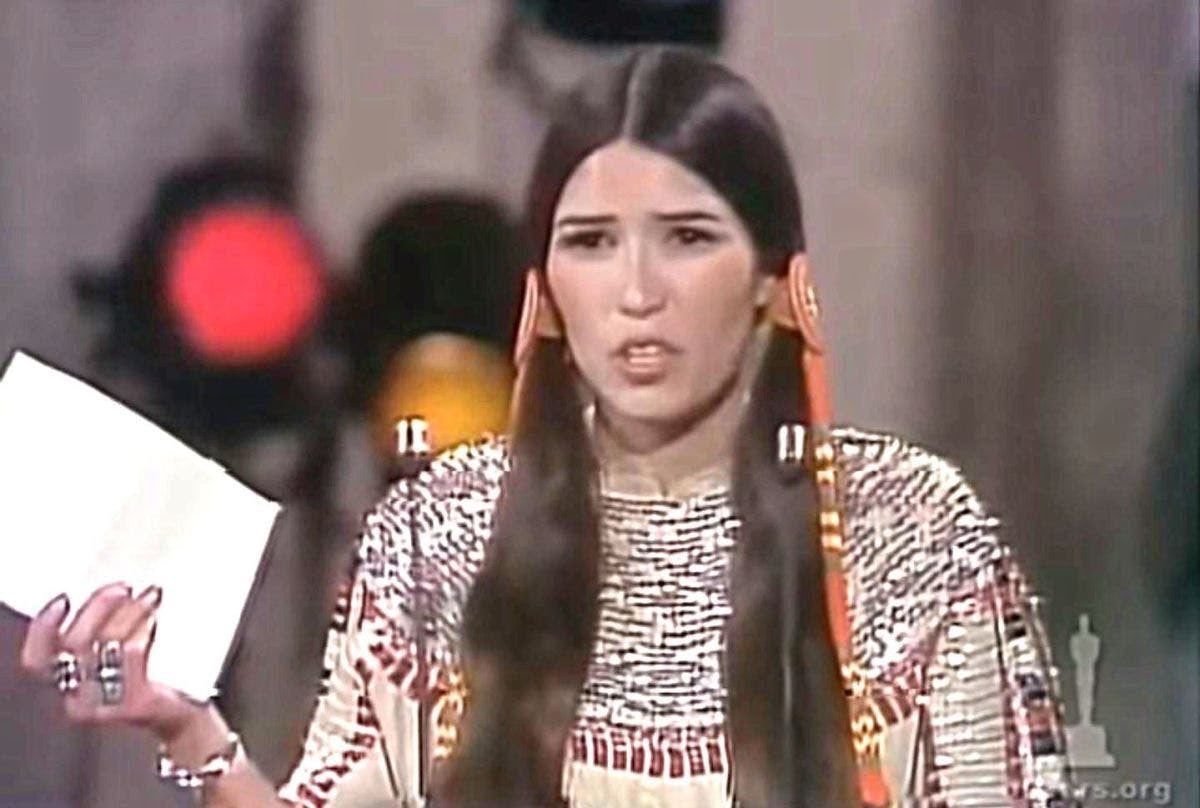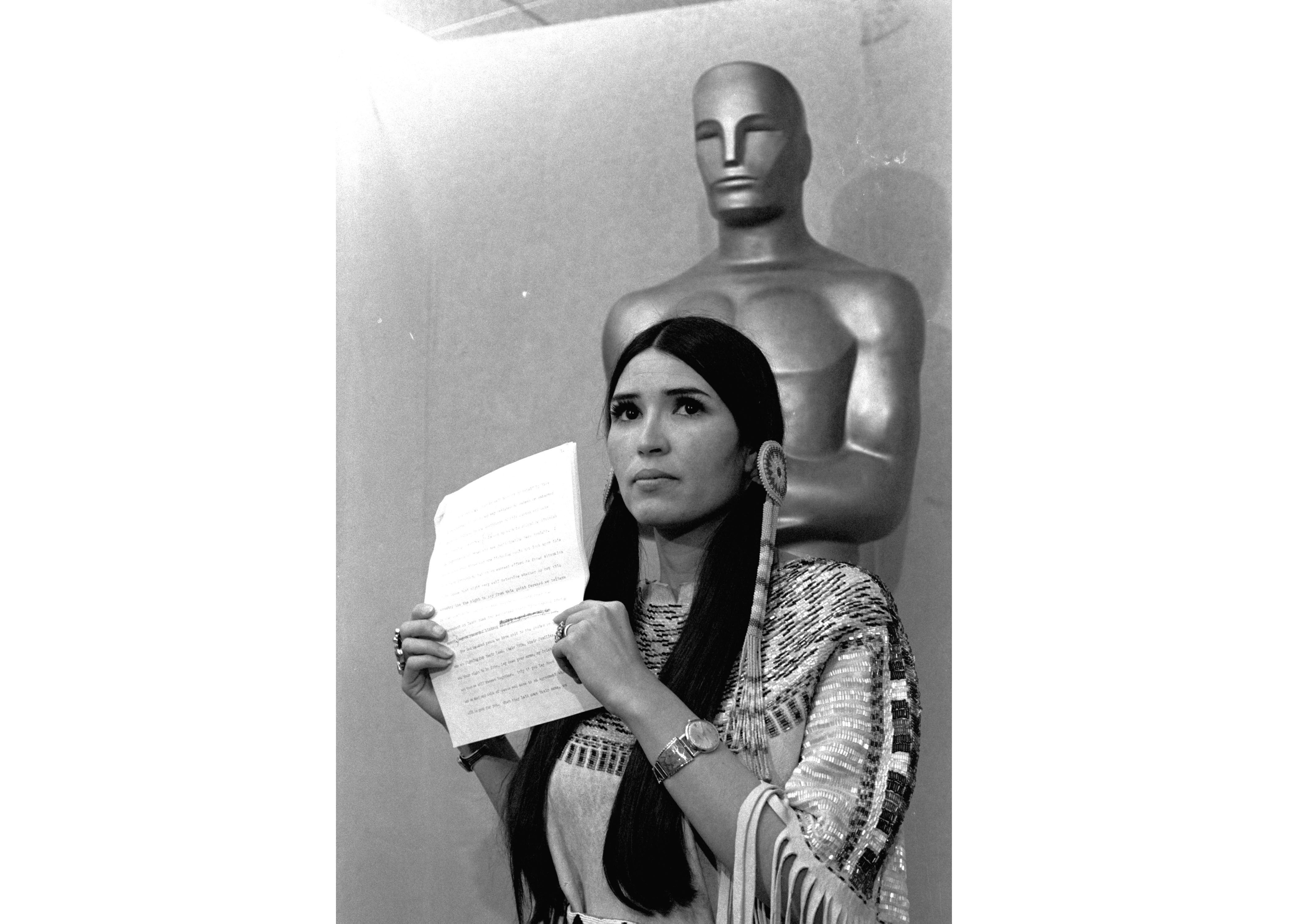Sacheen Littlefeather: Who is the Native American activist who refused Marlon Brando’s Oscar?
Actress finally receives apology for abuse and blacklisting after almost half a century
Native American activist and actress Sacheen Littlefeather became famous around the world on 27 March 1973 when she ascended the stage at the 45th Academy Awards to reject the Best Actor statuette intended for Marlon Brando live on TV.
The acclaimed Method actor, who won for his iconic performance as Italian mob boss Vito Corleone in Francis Ford Coppola’s The Godfather (1972), declined to attend the Oscars ceremony in Los Angeles, and asked Ms Littlefeather, 26, to go in his stead to refuse the trophy on his behalf.
The star had become interested in Native American rights, in particular the brutal federal response to Wounded Knee, at which more than 300 Lakota men, women and children had been massacred by the US Army on 29 December 1890 and regarding which protests were then ongoing.
Born Marie Louise Cruz in Salinas, California, on 14 November 1946, Ms Littlefeather had appeared in small roles in the films Counselor at Crime and The Laughing Policeman that year, but was more prominent as an indigenous rights campaigner.
Dressed in a traditional Apache buckskin dress, she ascended the steps to the stage to the evident surprise of award presenters Roger Moore and Liv Ullmann.
She refused to even touch the gold statuette offered to her by Moore and instead spoke for about 60 seconds, telling the almost entirely white audience: “Hello. My name is Sacheen Littlefeather. I’m Apache and I am president of the National Native American Affirmative Image Committee.
“I’m representing Marlon Brando this evening, and he has asked me to tell you in a very long speech which I cannot share with you presently, because of time, but I will be glad to share with the press afterwards, that he very regretfully cannot accept this very generous award.
“And the reasons for this being are the treatment of American Indians today by the film industry… excuse me... and on television in movie reruns, and also with recent happenings at Wounded Knee. I beg at this time that I have not intruded upon this evening, and that we will in the future, our hearts and our understandings will meet with love and generosity. Thank you on behalf of Marlon Brando.”
Some boos rang out (as did some applause). Western star John Wayne was reportedly waiting in the wings to confront her, and was said to be so furious he had to be restrained by six security guards, Meanwhile, subsequent presenters Raquel Welch and Clint Eastwood both made disparaging remarks about the gesture.

“I focused in on the mouths and the jaws that were dropping open in the audience, and there were quite a few,” Ms Littlefeather remembered recently. “But it was like looking into a sea of Clorox, you know, there were very few people of colour in the audience.”
Later that evening, she did read out the full statement Brando had prepared at an Oscars press conference, the text of which was published in The New York Times the following morning.
However, Ms Littlefeather has since claimed that she was “silenced” by Hollywood following the protest and, despite appearances in Freebie and the Bean, The Trial of Billy Jack (both 1974), Johnny Firecloud and Winterhawk (both 1975), she did not make another movie between 1978’s Shoot the Sun Down and the 2009 documentary Reel Injun.
She has since been made the subject of another documentary, Sacheen: Breaking the Silence (2018), but has only now received an apology from the Academy of Motion Pictures Arts and Sciences over the abuse she suffered in response to her brave stand.

In a letter of reconciliation posted to the Academy website on Monday 15 August, the institution’s former president David Rubin acknowledged: “The abuse you endured because of this statement was unwarranted and unjustified.
“The emotional burden you have lived through and the cost to your own career in our industry are irreparable. For too long the courage you showed has been unacknowledged. For this, we offer both our deepest apologies and our sincere admiration.”
In response, Ms Littlefeather, now 75, has agreed to speak at the Academy Museum of Motion Pictures on 17 September to discuss her experiences and the future of indigenous representation on screen and has expressed her happiness at the belated bid to make amends.
“This is a dream come true,” she said in a statement. “It is profoundly heartening to see how much has changed since I did not accept the Academy Award 50 years ago. I am so proud of each and every person who will appear on stage.”



Join our commenting forum
Join thought-provoking conversations, follow other Independent readers and see their replies
Comments